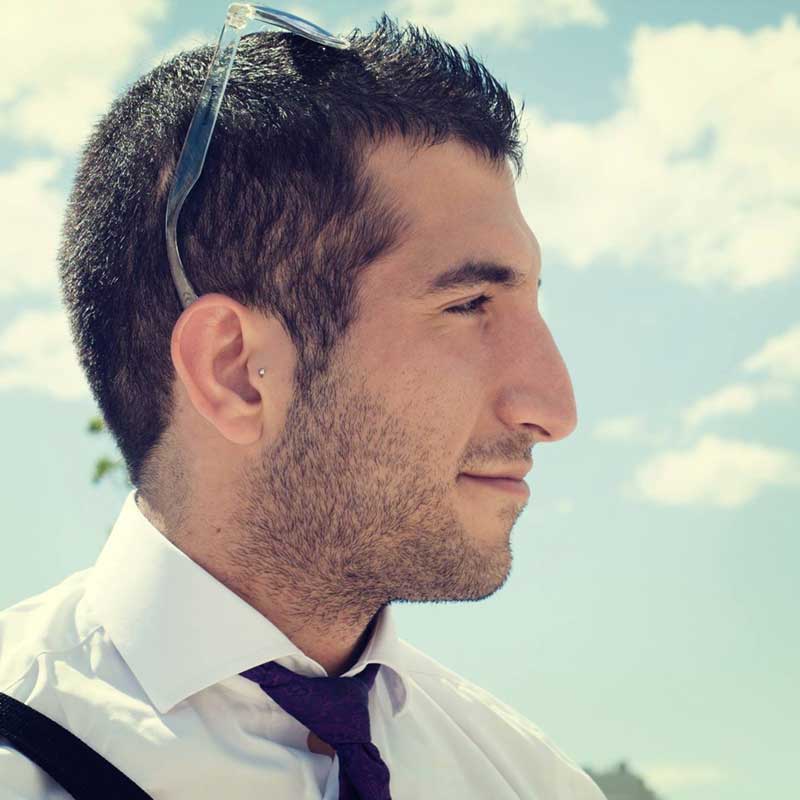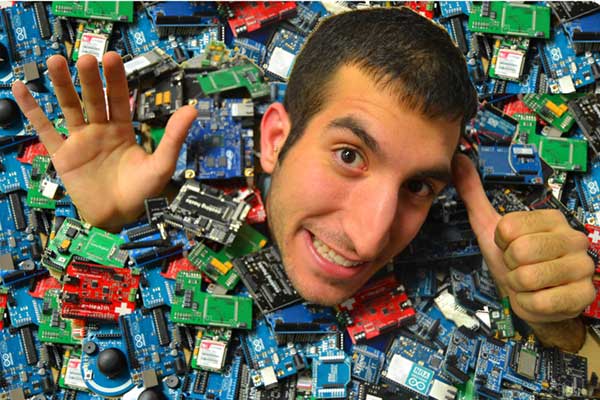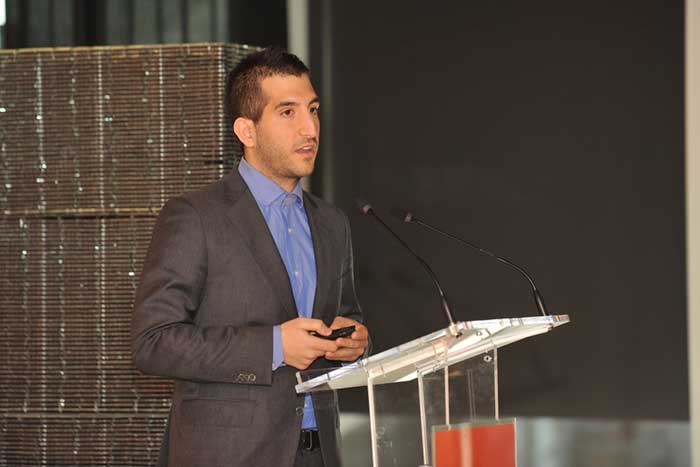“It’s not technology which dehumanizes us, but how we use it”
Since he was a child, Luis Martín (Zaragoza, 1990) couldn’t help the urgency to dismount his toys and go through their insides. The fun for him was not so much in playing but in understanding how they did function. And, if possible, change it, to turn those toys into something else, by adding different features and new capabilities. In one word, his aim was to invent those toys all over again. He soon realised that was exactly what he wanted to become: an inventor. But at the same time our man learned that there was no itinerary set within the education system to achieve that goal. So if he was to become an inventor, first he would need to invent himself. Luis will be one of the speakers at the De los Pies a la Cabeza multiconference event.
- You’ve been quoted as saying: “I’ve been an inventor since I can remember”. Was it a vocation, an impulse?
- You know when your parents ask you what you wish to be when you grow up… My answer was always this: an inventor. I would only play with my Christmas presents for a couple of days, but very soon I would feel the urge to dismount those toys, mixing pieces and trying to make them function. When I was 9 I got the Power Rangers Transformer robot. I liked it, yes, but soon I found it was very limited: all it did was walking back and forth and that was it, it didn’t fire missiles or anything of the kind. So one weekend I in my little village, I tore it to pieces and reconstructed it using a radio control car and a firing turret. In my mind that had to work perfectly, but the truth was it never did. My mom slapped me (laughing), but this whole process taught me a lesson: very often things don’t work at first. And I’ve always kept that robot as a reminder.
- The real failure lies in not trying…
- Sometimes I wouldn’t get things to function on the first go… but if I kept trying, eventually they did. Maybe not in the most proper way, but I found that was good enough, it was a breakthrough. And there’s another thing to be learnt here: always try to improve what you have already achieved. Don’t settle for a 5. At University I fixed my bicycle brakes with cello tape, which would make people laugh. They kept saying somebody would take it away, but I was happy because it actually worked. So when I graduated and got hold of my first 3D printer, I designed my own fixing model and improved it. And last year I even invented my first light brake, connected to the mobile phone, and fitted it.
- Deconstructing seems to be a very human thrive: it’s like trying to understand what’s behind the obvious, how the world works.
- Sure… My father used to own and electricity workshop and I learned from him and had the knowledge to understand how things worked electrically and mechanically. But eventually I would bump into one of these black little cockroaches called chips, and I couldn’t break them. That pushed me towards electronic engineering, to help me understand what was beyond me.

- Does an inventor actually invent himself?
- It is difficult to say. As a kid you soon perceive there’s something not quite in place when you experiment with drinks and hot chocolate and your parents threaten you will have to drink up the resulting concoction. To me, videogames have been my biggest inventing field. When you are a kid everybody keeps you away from getting a hammer and some screws, to prevent you from hurting yourself. That’s why videogames opened the door to being whatever you wished to be and let your imagination fly free. I spent my childhood playing games in which I could be a blacksmith, a furrier o whatever came through my mind. That allowed me to push the limits.
- Is the educational system to blame or is it just prejudice against inventors?
- A bit of all. I was lucky to leave university when I did, a time when the open-source and soft-maker movements were growing bigger. I don’t know what I would have done if I had finished my degree in the 90s, when all the labs were devoted to military or educative use and you couldn’t go further.
- Innovation has become the talk of the town and ideas are still the platform for progress.
- Some might say ideas are everything, others will reply they are nothing. In my opinion, and idea is the most, but it needs to be worked upon if it is to materialize itself into something real. That process is what really makes an inventor out of you. The biggest problem is that you have nobody to look up to.
- Inventors are called entrepreneurs these days…
- Some people call me an entrepreneur, but I feel more like an innovator, since I’m not that interested in the business side of the whole thing. I like creating things that are useful to people, but you don’t find any referents on that field in Spain. Our inventors here have been Juan de la Cierva and his son, but all their inventions were destined to become patents. They had hundreds of them… That’s not my thing, plus I don’t have the financial possibilities, the tools or the contacts to do anything like that. In the USA, all the young students have access to their parent’s workshop in the garage, at home. And they spend time assembling maybe a racing car or something like that. That’s utterly impossible in Spain, unless you fix a Vespino moped’s clutch in your village house.
- Are you then some kind of philanthropist?
- It’s not about philanthropy. I like to make my living out of my work, creating my own stuff and allowing people to use it. Of course, a company could commercialize what me and my team do, but patenting inventions is not my goal. Patents to me are a meaningless barrier. Let’s magine someone starts working to build a time machine, and let’s suppose it takes him 10 years… It makes no sense at all that it closes the door to any other person who could actually achieve the same thing at the same time.
- Are there any alternatives in this competitive world?
- Open-source is a great answer to that. Licensing an invention, which is like a patent of use, and doing it with free of charge, making no benefits whatsoever out of it … I think that is crazy and will be the future. The moment you license a product, everybody knows it is yours. That is what block-chain is all about: decentralizing knowledge, information, patents… that is a big power shift.
- That’s the sign of times.
- So they say: we are more together. Nowadays, the biggest innovation power lies on the people, at least 50%. Some developments still come from big companies, but more and more often it is makers, just ordinary people, who do that.

- Inventions help us to progress or do they dehumanize us?
- Technology is not to blame, but how we use it is the problem. We are calling for a more human use of technology. Avoiding visual interfaces, such as screens… Many of the projects we are working on at the moment are thought for kids and the idea is allowing them to work with physical shapes, cubed, squared shapes, which allow them a high technological interaction. We need to be aware what technology is and where it will take us if we don’t use it properly. Human nature is what it is and stopping that is a very difficult task. We need to adapt the best we can and keep working to create friendly technology.
- You are calling for independence, but technology is making us all increasingly dependent…
- Technology is here to make us independent of some tasks. But many of the applications we get are made for leisure and fun, and that creates a dependence… New technologies appeal to the young ones, but that has always been like that in the past. The turning point must be addiction, like with any other drugs.
- Technology is fleeting as it’s never been before, isn’t it?
- There’s always a big hype, whatever it lasts, but then everything becomes obsolete very soon. What’s not renewed is not liked. Take augmented reality, for instance. It had a peak and then it fell… The same with Pokemon and Pokemon Go, first came the fever, then it went down. Everything becomes a passing wave, sooner or later. It is very difficult to find a technology that stays long enough to become an axis in our lives. Thinking we will end up attached to a virtual reality device and that we will not get out of our houses anymore… that is not realistic at all.
- Let’s finish with another quote: “Being good is not enough, you want to be the best”.
- Competition is ferocious. If you have an idea, it is fair to say that nobody else can have it… but someone will surely have another one very similar to yours. So the only thing you can do is get down to work on it as soon as possible. If you don’t, someone else is going to do it while you are wasting your time. That work ethic is the difference between what will go ahead and what will not. If you want to be the best, you must be the best from the go.

